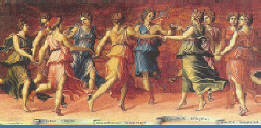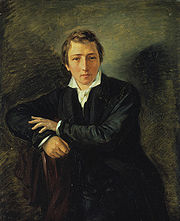|
|
Heine was born in Düsseldorf to a Jewish family and attended the local Lyceum before moving
to Hamburg where his uncle provided financial encouragement for him to attempt a business
career, which, however, ended in failure.
From 1819, he attended universities in Bonn, where he benefitted from tuition under Schlegel
who was of lasting influence, and the less satisfying Göttingen before finally attending
Berlin university where he was able to meet numerous leading literary figures. Whilst
there, he achieved limited success as a poet, journalist and playwright.
His early poems were influenced by the North Sea and by the Harz mountains both of which he
visited during his studies.
For career reasons, he converted to Christianity shortly before graduating in 1825
afterwards briefly visiting England leaving with mixed feelings for an editorship in
Munich. He travelled briefly to Italy thence to Hamburg but he finally departed for
Paris in 1831 where he married Eugénie "Mathilde" Mirat.
He gained increasing recognition from his steadily greater output but suffered from a
spinal disease which claimed his life in 1856 after 8 years bedbound existence.
Heine was the pre-eminent lyric writer of 19th century German poetry blending human
expression with pastoral commentary often assisted by a degree of cynicism; and his
works have gained wider fame in the lieder of several great composers.
|

